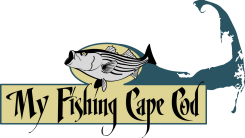For many anglers, fly fishing represents the pinnacle of fishing artistry, combining skill, patience, and an intimate connection with nature.
A few years ago I had the pleasure of speaking with Ian Bragdon, a talented young fly angler and guide. During that conversation Ian shared his wealth of knowledge about fly fishing on Cape Cod.
Starting his journey in Michigan's freshwater streams, Ian brought his expertise to Cape Cod, where he adapted to the challenges of saltwater fishing.
In the following post and podcast, Ian offers detailed insights on targeting trophy striped bass, emphasizing the importance of using heavy tackle (9-10 weight rods) and large flies up to 10 inches. The article and podcast further explores the differences between shore and boat fishing techniques, with specific guidance for each approach.
Beyond striped bass, Ian discusses opportunities for catching bluefish, false albacore, and even bluefin tuna on the fly. He also highlights Cape Cod's often-overlooked freshwater fishing scene, with hundreds of kettle ponds offering excellent opportunities for smallmouth bass, trout, and other species.
Whether you're a seasoned angler or newcomer to fly fishing, Cape Cod offers year-round opportunities for anglers of all skill levels. So without further ado lets' dive right in!

